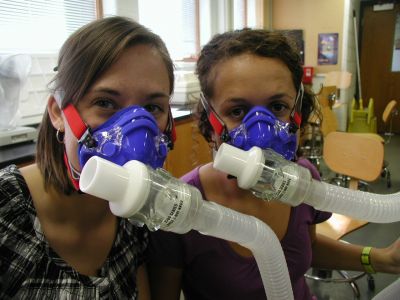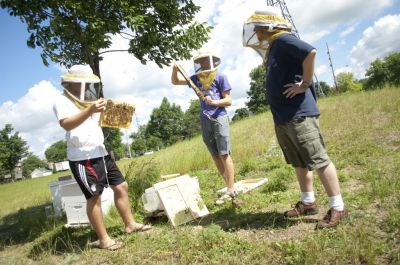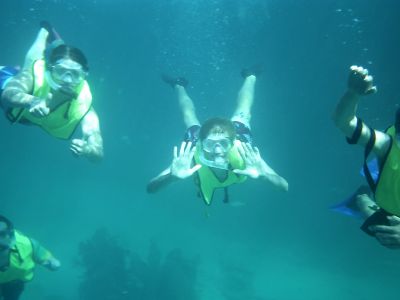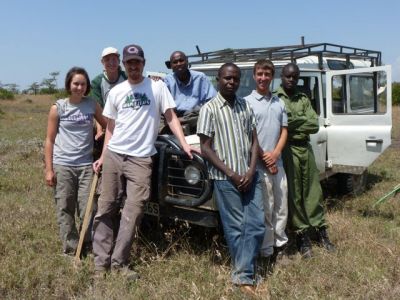Student Research
The biology department encourages all students to get involved in research projects to develop their scientific skills, test their interests and work to address answers to the world’s complex problems. There are a variety of ways to get involved in research.
Coursework

Most of the biology courses have independent research projects as laboratory components. This is a great way to get started.
Junior & Senior Seminar
During your junior year you will take a 2-credit course in which you will design, propose and begin implementing a collaborative team-based research project. This project should match your interests: it could be a lab-based investigation, a field research project, or a sustainability initiative. By your senior year, you will work with your team to publicly present your findings during the 1-credit Senior Seminar.
Research during the academic year
Each year faculty supervise some students in research projects during the school year. Typically students commit to working 5-7 hours per week on a project. Many of these activities can help prepare students for their junior research projects.
a. Fall faculty research presentations – Each fall, faculty will present their projects to all biology students in one of the BSD Coffee Hours. During this time you will learn which professors have openings in their labs.
b. Applying – Email the professor directly if you are interested in applying to work with them. Professors are free to select students based on student experience, performance in classes and/or needs in their lab.
c. Credit – The main goal for research is to involve students in learning new skills. However, you may elect to receive credit for your research where 40 hours of work = 1 credit of BIOL 400 Biology Research.
i. Register for BIOL 400 Biology Research credit like you would sign up for a class.
iii. Log your hours in your research lab book.
d. Financial rewards – After students work for 40 hours on a project with a professor, they are eligible to receive pay for their work at $7.50 per hour. Payment is warranted because students with more experience are expected to teach the newer students the ins and outs of the research protocols. With more responsibility comes more reward! (Students may not receive both pay and credit for their work.)
Maple Scholars Summer Research Program
Each summer 15-20 students are selected to work with an individual professor on their research project for 8 weeks (for most of June and July).

a. Faculty apply to host a project – Each November faculty send applications to the Maple Scholars Committee to have a project included in the summer’s listing.
b. Projects announced – Early in the spring semester, projects are announced and advertised on the Maple Scholars website. Students have until early February to apply for the projects in which they are interested.
c. Logistics – Students are paid a $2500.00 stipend, in addition to the provision of room and board on campus!
Marine Biology Internship Program

Each summer two Goshen students were selected to work with Dr. Mark Butler for 4-6 weeks at the college’s J.N. Roth Marine Biology station in the Florida Keys. The current program is being modified with the advent of the marine biology semester. See your advisor for updates.
a. Application – Each February students will be invited to apply to the program. Applications are available here and due Feb 15.
b. Logistics – Students are paid a $1000.00 stipend, in addition to free housing at the station. Students are responsible for their own transportation and food while in FL.
Previous Marine Biology Interns
2019 – Emily Brandeberry & Max Burkholder
2018 – Keila Flores & Josh Liechty
2017 – Cody McCoy & Reena Ramos
2016 – Morgan Short & Ben Wiebe
2015 – Kate Vendrely
2014 – Caleb Longenecker & Aaron Stiffney
2013 – Barrett Donna & Avery Bischoff
2012 – Mike Zehr & Aaron Kauffmann
2011 – Zachary Clouse & Kurt Neufeld
2010 – Nathaniel Tann
2009 – Camry Hess & Nate Burmester
Kenya Wildlife Ecology Research
During the summer of 2013 and 2014, BIOL 375 Conservation Biology & Research Methods in Savannas, was in Laikipia, Kenya at Mpala Research Centre. This 3-week course is open to all students and demonstrates the key links between ecological theories and conservation.
After the completion of the class, 3-4 students are selected to remain in Kenya for 3 weeks of research, assisting in field work. See the Kenya 2011 blog, Kenya 2013 blog, and/or the most recent 2014 blog to get a better idea of the kinds of work students do.
Additional research occurred in 2016 with four students contributing additional work to understanding the role fire plays in mediating coexistence of acacia-dwelling ant species.
 The next Kenya field research experience will be during the 2020-21 academic year.
The next Kenya field research experience will be during the 2020-21 academic year.
a. Application – Applications will be advertised via the Biology department list-serve.
b. Selection – Students will be selected based on course performance, recommendations, statements of research interest, and interest in ecological research.
c. Logistics – Students are responsible to pay for their own airfare. Their living expenses will be covered.




